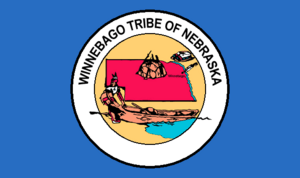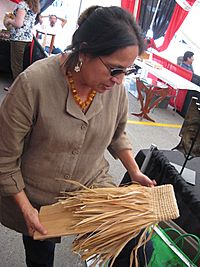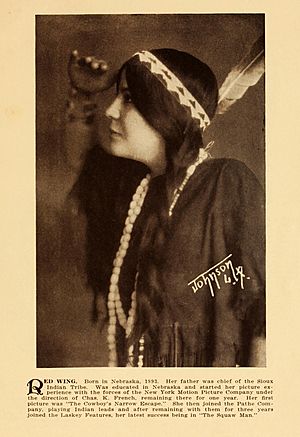Winnebago Tribe of Nebraska facts for kids

Tribal Flag
|
|

Enrolled tribal member Martha Gradolf, a weaver
|
|
| Total population | |
|---|---|
| 4,192 | |
| Regions with significant populations | |
| Languages | |
| English, Ho-Chunk | |
| Religion | |
| traditional tribal religion, Native American Church | |
| Related ethnic groups | |
| other Ho-Chunk people, Otoe, Iowa, and Missouria people |
The Winnebago Tribe of Nebraska (Ho-Chunk: Nįįšoc Hoocąk) is one of two federally recognized tribes of Ho-Chunk, along with the Ho-Chunk Nation of Wisconsin. Tribe members often refer to themselves as Hochungra – "People of the Parent Speech" in their own language, a member of the Siouan family.
Reservation
The tribe had (by the treaty of 1846) a vast wilderness area in central Minnesota Territory, the Long Prairie Reservation. The Winnebago Reservation, established by a treaty on March 8, 1865, is in Thurston and Dixon counties, Nebraska, and Woodbury County, Iowa. The reservation is 176.55 square miles (112,990 acres; 457.3 km2), of which 27,637 acres (43.183 sq mi; 111.84 km2) is tribal trust land. In 1990, 1,151 tribal members lived on the reservation.
Language
The Winnebago Tribe speaks English and Ho-Chunk (Hocąk), one of the Western Siouan languages, part of the Siouan-Catawban language family.
Economic development

Ho-Chunk, Inc. is the tribe's corporation; it provides construction services, professional services, and business and consumer products. The Winnebago Tribe also owns and operates the WinnaVegas Casino Resort, hotel, and Flowers Island Restaurant and Buffet, all located in Sloan, Iowa. Ho-Chunk, Inc. has been recognized several times for exercising good governance and creatively solving issues faced in the tribe. Administered by the Harvard Project on American Indian Economic Development at the Harvard Kennedy School, it's been awarded an Honoring Nations award in 2000, 2002, 2006, and 2015.
Juvenile Services
The tribe worked with the Nebraska Crime Commission to create a comprehensive plan for responding to juvenile safety and crime prevention issues. The most recent revision of the "Winnebago Tribe of Nebraska Comprehensive Juvenile Services Plan" lists three primary areas of need:
- Responsibility and awareness for youth distributed across the whole community.
- A higher level of community organization.
- A better coordinated and more comprehensive juvenile justice system.
In 2012, the Winnebago Juvenile Justice Planning Team (WJJPT) was formed to assist with youth outreach and public safety. The WJJPT has planned and carried out a variety of public safety initiatives such as school outreach programs and planning a Crisis Intervention Center.
Notable tribal members
- Joba Chamberlain (b. 1985), Major League Baseball pitcher from 2007-2016
- Henry Roe Cloud (1884–1950), educator, college administrator, US federal government official, Presbyterian minister; first full-blood Native American to attend Yale College
- Angel De Cora (1871–1919), artist, educator, and Indian rights activist
- Terri Crawford Hansen (b. 1953), journalist
- Frank LaMere (1950–2019), activist, advocate, politician
- Lexie Wakan LaMere (May 16, 1992 – January 3, 2014), first native to graduate from Senate Page school; youngest delegate in the Nebraska Democratic Party
- Renya K. Ramirez (b. 1959), anthropologist, author, and Native feminist
- John Raymond Rice (1914–1950), U.S. Army in service of UN Forces in Korean War
- Reuben Snake (1937–1993), chairman of the American Indian Movement and the tribe, and later president of the National Congress of American Indians
- Lillian St. Cyr, known as Red Wing (1884–1974), an actress of the silent film era

